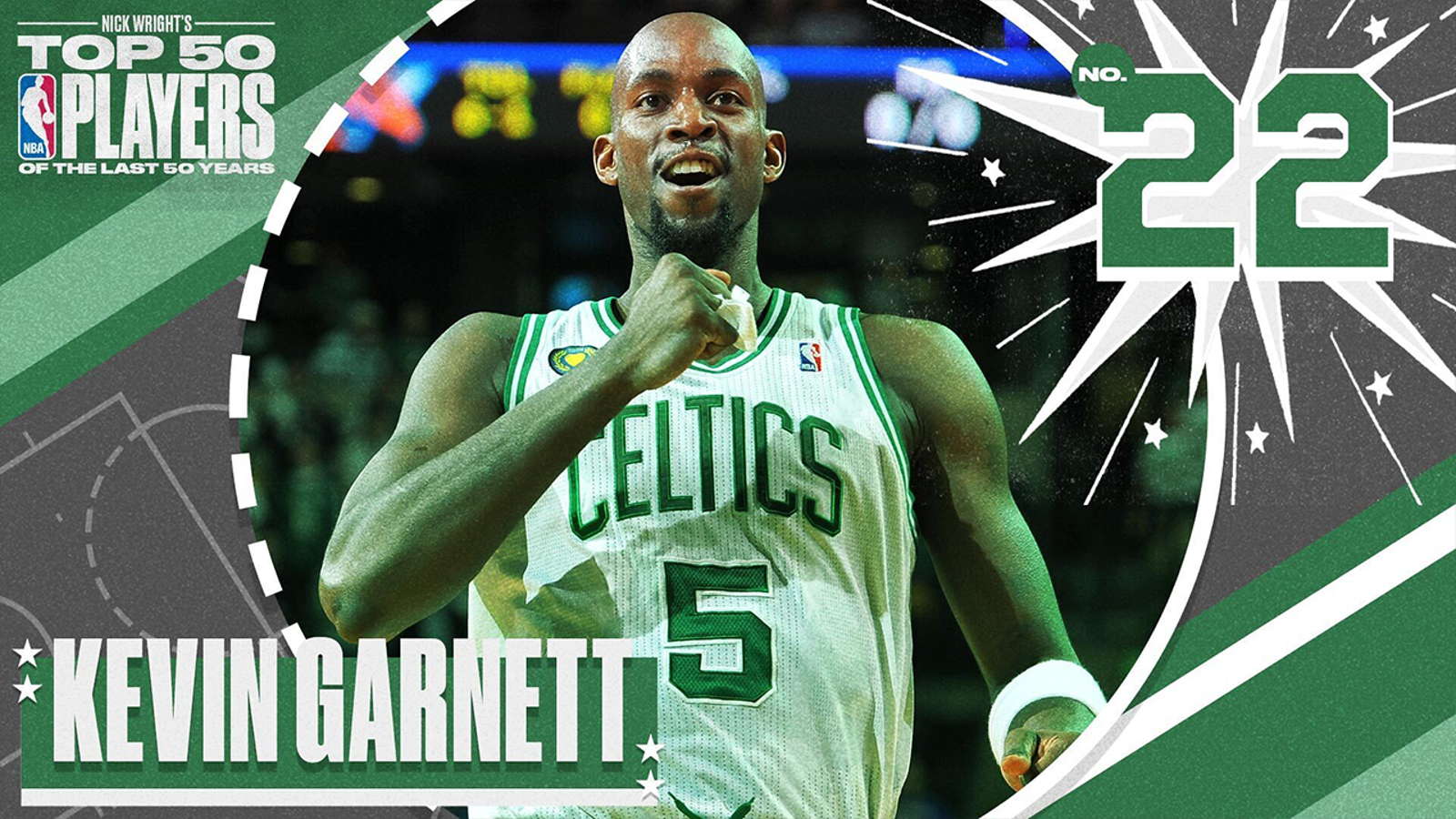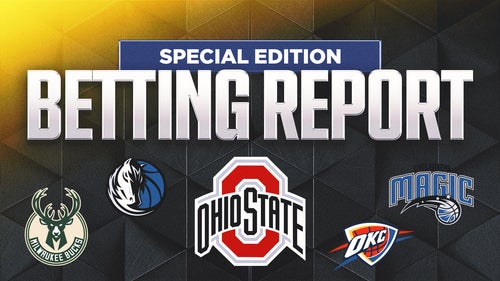
Top 50 NBA players from last 50 years: Kevin Garnett ranks No. 22
Editor's Note: As part of a new series for his podcast, "What’s Wright with Nick Wright," FOX Sports commentator Nick Wright is ranking the 50 best NBA players of the last 50 years. The countdown continues today with player No. 22, Kevin Garnett.
Kevin Garnett's career highlights:
- 2004 MVP
- 15-time All-Star
- Four-time first-team All-NBA, three-time second team, two-time third team
- 2008 Defensive Player of the Year
- Nine-time All-Defensive first team, three-time second team
- Four-time rebounding champion
- 1996 All-Rookie team
There’s a world in which Kevin Garnett’s apex more closely aligns with a title-contending club. It might have put him on par, historically speaking, with some of his higher-ranked peers. He certainly had as much talent as just about anyone from the past 25 years.
Parts of his résumé, particularly some from the playoffs, probably suggest otherwise.
If it wasn’t obvious, Garnett is on the Mount Rushmore of basketball players who turned pro directly out of high school.
"It’s gotta be LeBron [James], Kobe [Bryant], Moses [Malone], KG," Wright said. "Those are your top four by a mile."
KG ranks No. 22 on Nick Wright's list
Garnett’s journey to success just featured a few more hurdles early on. The sinewy 6-foot-11 prospect was a landmark selection at No. 5 overall by the Timberwolves in the 1995 NBA Draft, becoming the first high school player taken in 20 years. After an underwhelming first half to his rookie year, KG averaged roughly 15 points and nine rebounds on 54% from the field following the All-Star break.
Minnesota, which had yet to reach the postseason since entering the league seven years prior, made a pair of fateful choices in the loaded ’96 class that would inform its next decade – and Garnett’s.
The Wolves initially took Ray Allen at No. 5 but traded him on draft night for Stephon Marbury. The latter was an electric point guard who would make two All-Star teams, but only after forcing his way out of Minnesota midway through his third season. The former developed into one of the greatest shooters of all time and eventually competed for multiple championships alongside KG in Boston. Garnett was in his 30s by then. First, he had to endure years of playoff failure with his original franchise.
"The postseason stuff with KG is difficult," Wright said.
Garnett was the Wolves’ best player by his second season, an All-NBA selection by his fourth and the MVP runner-up by his fifth. "The Kid" was now "The Big Ticket," and his two-way brilliance had Minnesota in the playoffs annually — with seven straight first-round exits to show for it. Never mind that KG's postseason averages from this stretch (21-13-5) were virtually identical to his regular-season output.
The 2003 additions of cagey veterans Latrell Sprewell and Sam Cassell provided Garnett with more help than he’d ever known. He responded with the best season of his career, and inarguably the best in the league that year.
The near-unanimous MVP put up 24-14-5 with almost four blocks plus steals and was runner-up for Defensive Player of the Year. Moreover, the Wolves earned the No. 1 seed and reached the conference finals, where they narrowly lost to the Hall of Fame-laden Lakers. Garnett’s first deep playoff run featured 30 and 20 in the opener against the Nuggets, 30 and 20 in Game 7 of the conference semifinals against the Kings, and 30 and 19 to stave off elimination to Los Angeles. KG averaged 24-15-5 for the postseason.
Minnesota curiously missed the playoffs the next three seasons, despite Garnett being at the top of his game, before the Wolves honored the icon’s wishes to move on.
KG was just as impactful upon arriving in Boston, even if the numbers don’t say it. In 2008, he won what had been an elusive Defensive Player of the Year nod and served as the backbone to a 66-win Celtics squad. They needed at least six games to get through the ensuing four rounds, and KG shined in each one.
He put up 20 and 11 in a seven-game rock fight with the Cavaliers, including 26 and 16 to go up 3-2 in Game 5. Garnett posted 33 and 7 against the Pistons in Game 5 of the conference finals, which had also been knotted at 2-2. He had 26 and 14 against the Lakers in the clinching game of the Finals.
"I would argue he was the best player on the ‘08 Celtics," Wright said. "It’s certainly inarguable he was the best player of that regular season. Paul Pierce won the Finals MVP. I think it should have gone to KG."
Garnett was still in his prime but suffered a knee injury around the 2009 All-Star break that ultimately derailed Boston’s repeat bid.
Over the next five years, the aging power forward sprinkled in a handful of vintage performances amid mostly modest ones while remaining a maniacal competitor through his late thirties. That includes playing a crucial, albeit supporting, role for the Celtics in additional trips to the Finals and conference finals. But his extended twilight, which concluded with a Timberwolves reunion, perhaps clouds him producing 22-12-5 with three blocks plus steals over his 11-best campaigns.
"His career [averages] are hurt by the fact that he came into the league at 19, and he played super long," Wright said.
Garnett’s 21 seasons did make for breathtaking counting numbers, however. He became a starter three months into his rookie year and never came off the bench again, tallying the third-most starts in league history (1,425). The do-it-all big man places top 20 in scoring, steals and blocks, the top 10 in rebounding, and just outside the top 50 in assists. KG and Kareem Abdul-Jabbar are the only two players taller than 6-foot-10 to collect 5,000 assists.
That’s not all Garnett shares with such NBA royalty.
"[He’s] one of the greatest defensive players of his era," Wright said. "[Among] guys who could drop 30 on you and were great defenders, one would argue of the last 30-something years, it’s Hakeem [Olajuwon], [Tim] Duncan and then Kevin Garnett."










